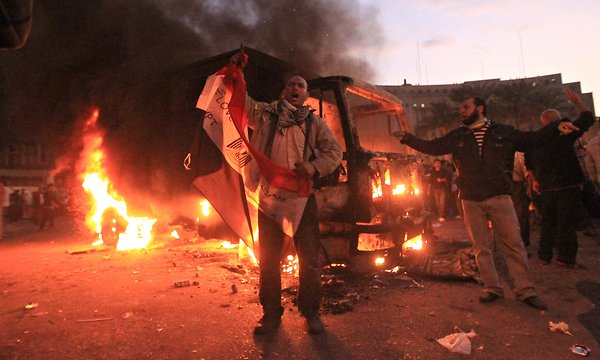
Egyptian parliamentary elections scheduled to start on November 28 are now facing the threat of cancellation or postponement due to renewed protests and violence in Tahrir Square since last Friday, November 18. According to the latest statistics, at least 676 injuries have been recorded in clashes between military police and the protesters who insisted on continuing their sit-in overnight, in defiance of Prime Minister Essam Sharaf’s statement urging protesters to leave Tahrir Square on Friday evening. With clashes continuing for a second day on November 20, central security forces used tear gas and live bullets to control the crowd but failed to disperse the demonstration as thousands more protesters, outraged by the violent crackdown, poured into Tahrir Square to demand an end to military rule.
Despite a statement by the ruling Supreme Council of the Armed Forces (SCAF) on November 20 insisting that elections will proceed on schedule, there are signs that major political forces are considering a boycott. In response to the clashes, the Revolution Continues Alliance, the liberal independent Amr Hamzawy, and Kefaya founder George Ishak have all put their campaigns on hold, to protest the use of violence against peaceful protesters, although they did not specify whether they plan to boycott elections.
Although Friday’s protest was largely orchestrated by Islamist groups, liberals and leftists quickly answered the call for a massive rally in Tahrir Square. Over the course of the day, these ideologically diverse groups showed unprecedented unity and cooperation in the hope of regaining the lost momentum of the revolution and resisting the SCAF’s political agenda. Given the level of anger and frustration with the military leadership, protesters were stunned and disappointed when Hazem Salah Abu Ismail, a potential presidential candidate and prominent Salafi intellectual, ordered his supporters to leave the square on Friday evening, after they had traveled long distances in trucks and buses to join the protest that morning.
The Friday protest was intended to assert major popular demands including but not limited to pressuring the SCAF to transfer power to a civilian regime and protesting the supra-constitutional principles proposed by Deputy Prime Minister Ali al-Selmi. However, Ismail’s surprising statement urging protesters to go home suggests that Islamist groups, especially Salafis, had another undeclared agenda behind the mass demonstration.
Apparently, they wanted to use the rally as a political opportunity to flex their muscles and do some free advertising for their parliamentary and presidential candidates. Islamist songs and recitations were loudly heard all over Tahrir Square. On the main stage, Hazem Abu Ismail gave speeches to his supporters that barely touched on the troubled state of Egypt’s political transition or al-Selmi’s controversial draft principles. From time to time, Abu Ismael’s followers responded by chanting, “Allahu Akbar” (“God is great”) and a man on stage shouted, “May Allah give His Support to Hazem.” Many analysts described the scene as “Kandahar Friday,” which I agree accurately sums up the Islamist tone of the rally.
Islamists – led by Salafis and the Muslim Brotherhood – are now mobilizing strong constituencies all over the country that are ready to support them in parliamentary elections. The leaders of these movements, however, are abusing Egyptians’ religious piety to score political points, while liberals and leftists who sacrificed their lives in Tahrir Square in January to bring down a dictator are mostly distracted and disorganized.
In my next post, I will speak more about the parliamentary elections from an insider’s point of view, as a liberal revolutionary and human rights activist who is now running for parliament in Cairo.
Dalia Ziada is competing in the November 2011 parliamentary elections as a candidate for the Eladl Party, a new party founded by young revolutionaries to affirm a moderate Egyptian religious and political ideology.
Photo Credit: Getty Images
Image: 20111120_600_EGYPT-slide-BWTX-articleLarge.jpg
